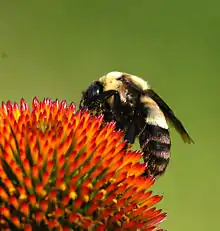Bombus fraternus
Bombus fraternus is an endangered species of bumblebee known commonly as the Southern Plains bumblebee.[2] It is native to the United States east of the Rocky Mountains. It is most often encountered in the Southeast, in areas with sandy soil. They range from New Jersey to Florida, North Dakota, South Dakota, Nebraska, Colorado, and New Mexico. There has been a bee found in Chihuahua, Mexico[3] It is uncommon today, having faced declines in population; its estimated abundance is less than 15% of historical numbers.[1]
| Bombus fraternus | |
|---|---|
 | |
| Scientific classification | |
| Kingdom: | Animalia |
| Phylum: | Arthropoda |
| Class: | Insecta |
| Order: | Hymenoptera |
| Family: | Apidae |
| Genus: | Bombus |
| Subgenus: | Cullumanobombus |
| Species: | B. fraternus |
| Binomial name | |
| Bombus fraternus (Smith, 1854) | |
Description
It is unusual among Bombus species in having the hairs of the body pressed against the body surface rather than "fluffy" as is true for nearly all other species. The bumblebee is black, with two yellow bands across the thorax and the anterior part of the abdomen of the queen and worker. The male usually has only one yellow band.[4] The queens have a body length of 21–27 mm, males 19–25 mm, and workers 13–18 mm.[3]
Behavior
The bumblebee is active from March to November. Among plants visited are Bidens, Padus, blanket flower, bush clover, Eryngium, Hypericum, Monarda, sumac, and Vaccinium.[4]
References
| Wikimedia Commons has media related to Bombus fraternus. |
- Hatfield, R., et al. 2014. Bombus fraternus. The IUCN Red List of Threatened Species. Downloaded on 05 March 2016.
- NatureServe. 2015. Bombus fraternus. NatureServe Explorer Version 7.1. Accessed 4 March 2016.
- "Species Bombus fraternus - Southern Plains Bumble Bee - BugGuide.Net". bugguide.net. Retrieved 2019-07-16.
- "Discover Life - Apidae: Bombus fraternus". Discover Life (American Museum of Natural History). Retrieved March 2, 2009.
External links
- Bumblebees of Florida. Aid to identification.
